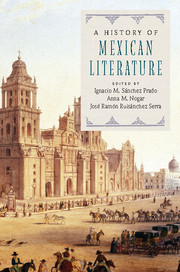Book contents
- Frontmatter
- Contents
- List of contributors
- Introduction
- PART I COLONIAL LITERATURE
- PART II THE NINETEENTH CENTURY
- PART III TWENTIETH AND TWENTY-FIRST CENTURIES
- 15 The Ateneo de la Juventud: The Foundations of Mexican Intellectual Culture
- 16 Regimes of the Avant-garde: Colonialists, Stridentists, Proletarians, Surrealists, Contemporáneos, and Independent Rupture (1920–1950)
- 17 The Institution of Fiction: From Yáñez, Rulfo, and Fuentes to Pitol and Del Paso
- 18 Octavio Paz: Literature, Modernity, Institutions
- 19 Mexican Poetry after the Avant-garde
- 20 Nonfictions: Essay, Criticism, and Chronicle
- 21 Balancing Acts: Twentieth- and Twenty-First-Century Mexican Theater
- 22 Women Writers in the Land of “Virile” Literature
- 23 The Hidden Histories of Gender: LGBTQ Writers and Subjectivities in Mexico
- 24 Mexican Literature in the Neoliberal Era
- PART IV MEXICAN LITERATURE BEYOND BOUNDARIES
- Index
- References
17 - The Institution of Fiction: From Yáñez, Rulfo, and Fuentes to Pitol and Del Paso
from PART III - TWENTIETH AND TWENTY-FIRST CENTURIES
Published online by Cambridge University Press: 05 July 2016
- Frontmatter
- Contents
- List of contributors
- Introduction
- PART I COLONIAL LITERATURE
- PART II THE NINETEENTH CENTURY
- PART III TWENTIETH AND TWENTY-FIRST CENTURIES
- 15 The Ateneo de la Juventud: The Foundations of Mexican Intellectual Culture
- 16 Regimes of the Avant-garde: Colonialists, Stridentists, Proletarians, Surrealists, Contemporáneos, and Independent Rupture (1920–1950)
- 17 The Institution of Fiction: From Yáñez, Rulfo, and Fuentes to Pitol and Del Paso
- 18 Octavio Paz: Literature, Modernity, Institutions
- 19 Mexican Poetry after the Avant-garde
- 20 Nonfictions: Essay, Criticism, and Chronicle
- 21 Balancing Acts: Twentieth- and Twenty-First-Century Mexican Theater
- 22 Women Writers in the Land of “Virile” Literature
- 23 The Hidden Histories of Gender: LGBTQ Writers and Subjectivities in Mexico
- 24 Mexican Literature in the Neoliberal Era
- PART IV MEXICAN LITERATURE BEYOND BOUNDARIES
- Index
- References
Summary
Over the third quarter of the twentieth century, Mexican fiction becomes an institution characterized by recognizability, stability, reproducibility, and a collective sense of purpose. Defending Mexican culture and literature's place on the world stage was (and remains) an important goal for many writers. When Octavio Paz declares in El laberinto de la soledad (1950) that, after Europe's destruction in World War II, he and other Mexicans are “por primera vez en nuestra historia, contemporáneos de todos los hombres” (174) (for the first time in our history we are contemporaries of all mankind [194]), he expresses a desire for Mexican universality and identifies the culmination of a process of tension between local, national, and regional cultural traditions and foreign traditions, mainly European and increasingly of the United States, that has shaped Mexican and Latin American history and culture for centuries. That culmination – a moment of optimism crystallized in the Latin American boom – enables writers and critics to situate Latin American literature alongside literary traditions long considered more prestigious. In 1964, Ángel Rama insists that achieving universal status requires particular definition first (Rama, 1972: 9). Rama's argument is sustained when Gerald Martin emphasizes the mix of traditions that comprise Latin American national and regional cultures, concluding, “Not only is their literature structured by this reality, and by the multifold perceptions of this reality; it is also what their literature has very largely been about” (Martin, 2006: 638). A case in point is Manuel Zamacona, the aspiring writer and Mexicanist philosopher in Carlos Fuentes's novel La región más transparente (1958), who paraphrases Paz when he argues that “El pueblo de México … es el único contemporáneo del mundo” (Fuentes, 1958: 367; Mexico is the only nation contemporary with the world). I define the institution of fiction in Mexico as the result of a project of identifying, developing, and providing the grounds for the reproduction of a national literary tradition that is in turn defined in relation with other literary traditions. Following Jacques Rancière's definition of politics, I argue that writers participate in this project by carrying out through their publications, in thematic and formal terms, the “partition of the sensible, of the visible and the sayable” (Rancière, 2004: 10).
Agustín Yáñez's 1947 novel Al filo del agua represents a turning point in Mexican literature.
- Type
- Chapter
- Information
- A History of Mexican Literature , pp. 260 - 277Publisher: Cambridge University PressPrint publication year: 2016



